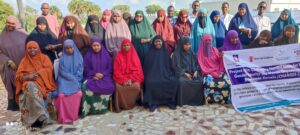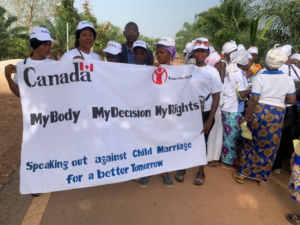Challenging discriminatory gender norms and attitudes
How Women and Girls’ Rights Groups stand up for change
International Women’s Day is a time to celebrate the achievements of women and girls across the globe, while also reflecting on the work that still needs to be done to achieve gender equality. While progress has been made, women and girls are still up against disproportionately discriminatory systems, attitudes, norms, and laws that prevent them from fully enjoying their rights. This is why it is important for us to work on challenging discriminatory gender norms and attitudes.
To support progress toward gender equality and advance the rights of girls and women, Save the Children partners with local women and girls’ rights organizations (WGROs). Research shows that local WRGOs are often best placed to respond to the unique needs of women and girls. Local WRGOs have a strong connection to the community and play a critical role in understanding the communities’ needs and the best approaches to addressing issues. Through collaboration with these important groups, we continue to make a significant change toward a world where children of all gender identities and expressions are equal.
What makes WGROs unique is that they are deeply rooted in communities and understand the dynamics of engaging with those in power, including politicians and leaders. WGROs are also better able to build relationships with people in hard-to-reach places because they know the culture, language, systems of oppression, and also the lived realities of women and girls. They are embedded in the community, respected, and trusted.
Decades of research have found that mobilizing independent women’s groups is the most important and consistent way to address Gender-Based Violence (GBV) in all its forms. WRGOs often maintain continuous engagement with their communities, which is an integral aspect of the prevention and reduction of GBV.
In order for Save the Children to be effective and reach the most women and girls, we partner with a range of WGROs, including formal organizations and informal community-led groups. Regardless of their status we recognize and promote their knowledge and priorities to advance gender equality and women’s and girls’ rights.
Here are a couple of examples where Save the Children partners with incredible local WRGOs to advance progress toward gender equality:
CHANGES: Partnering with formal WRGOs in Somalia
Challenging Harmful Attitudes and Norms for Gender Equality and Empowerment in Somalia (CHANGES1) is a four-year project by Save the Children and is co-funded by Global Affairs Canada and the Royal Norwegian Embassy. The goal of the project is to strengthen gender equality and the empowerment of women and girls in Somalia. CHANGES works to reduce and prevent rates of Child Early and Forced Marriage (CEFM) as well as Female Genital Mutilation/Cutting (FGM/C). WRGO partners are fundamental to the success of this project. These partnerships ensure we can work with government officials to advocate for the creation and/or implementation of gender equality laws and policies.

The WRGOs also support and mentor adolescent girls in Somalia to use their voices to create positive change toward gender equality. Adolescent girls will be trained in various advocacy activities to ensure their needs and desires for their futures are shared.
Some of these organizations include the NAGAAD Network, the Somali Women’s Study Center, and the Somali Women’s Coalition.
CEFM: Partnering with informal WRGOs in Sierra Leone and Burkina Faso
The My Body. My Decision. My Rights: Reducing Child, Early and Forced Marriage (CEFM) in Sierra Leonne and Burkina Faso project is a three-year initiative funded by Global Affairs Canada. This project aims to reduce CEFM while building supportive environments for girls to make decisions on their own future. It also teaches young girls the importance of fulfilling their equal human rights. The project works with local women and girls’ groups to tackle issues related to CEFM, gender equality, and adolescent sexual reproductive health and rights.


Save the Children recognizes local women and girls as key agents of change and acknowledges the value and effectiveness of women’s and girls’ collective action on the issues that impact them. After research was conducted, Save the Children trained and supported the WRGOs to create action plans to create change. These plans included ways to promote positive social norms to increase gender equality and change discriminatory norms in the community to ensure CEFM was prevented.
Working alongside WGROs to achieve gender equality and women and girls’ rights builds stronger and more resilient communities. It also helps to create sustainable outcomes for all and helps to advance our goal that all children may not only survive but also thrive.
By: Rachel Oryema, Gender Equality Advisor, Sarah Anderson, Senior Gender Equality Advisor, and Claudia Guidarini, Gender Equality Advisor
Footnotes:
1. The CHANGES project is in partnership with CARE International and the International Rescue Committee
Read more articles on gender equality programming from Save the Children Canada.


